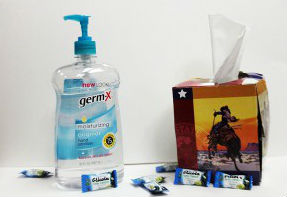Ebola Hysteria & Precautions
November 3, 2014
As the summer slowly shifts away, media reports of Ebola have created a sense of mass hysteria, imprinting the threat of disease on the minds of United States citizens. With the latest information filtering in every day, the fear of becoming sick has created an awareness of illnesses that has affected the way students go about an average day.
By taking on healthier habits, students can protect themselves from the spread of germs during cold and flu season and the upcoming winter weather. .
“Always wash your hands, eat healthy, use hand sanitizer, stay home when you are sick, cough and sneeze in your arm, and above all, drink LOTS of water,” school nurse Kristy Burrington said.
Students can protect themselves against regularly against the cold & flu by partaking in these five following steps:
- Always wash your hands.
Learn how to clean your hands & help prevent the flu
- Keep cleaning & disinfecting surfaces.
Germs not only live on your hands, but countertops and other common surfaces so it is important to disinfect regularly in your household.
- Cough & Sneeze into your sleeve.
By coughing or sneezing into your sleeve, this prevents other students from becoming ill as well.
- Get Vaccinated
Vaccines are extremely important in protection of various diseases for both adults and children alike. Ten million vaccines are given to children less than one year old each year in the United States. One of the most common vaccines are the flu shot, which is recommended or typically required depending on your location in the world.
“Yes, students should get vaccinated for the flu, unless you are allergic to eggs,” Burrington said.
What many people do not know, some flu shoot contain tiny parts of egg protein, which make people with egg allergies unable to take the vaccine.
- Stay home when you are ill.
Don’t spread your germs to others, it is better to stay home when you are sick.
Although Texas temperatures can remain mild until early November, another way for students can have healthier habits is to begin preparations for the winter weather ahead.
- Prepare your house and family members
Make sure your family has emergency back up plan and supplies, such as flashlights, batteries, and blankets. Begin to move pets indoors.
- Dress for the weather
Exposure to the cold can be extremely dangerous to a person’s health, so it is important to dress warmly in long sleeved shirts & jackets. Make sure to cover your ears, feet and hands. Many of the reason people wear hats is to protect the heat from escaping your body and cover your mouth with a scarf to protect your lungs.
- Recognize symptoms of winter exposure
In case you or another person experience any symptoms, check-in to a local hospital or clinic immediately.
Overall, Burrington suggests “Protect yourself from illness by getting vaccinated and taking care of yourself.”



